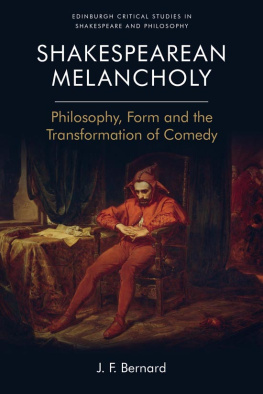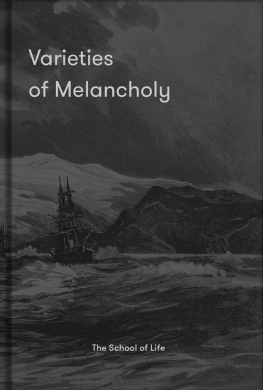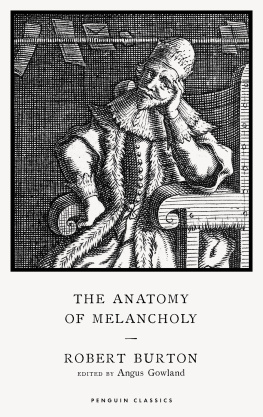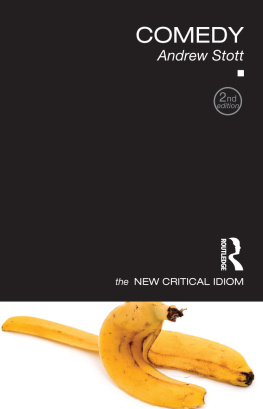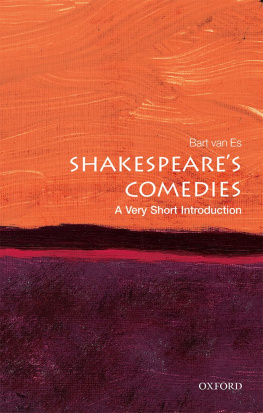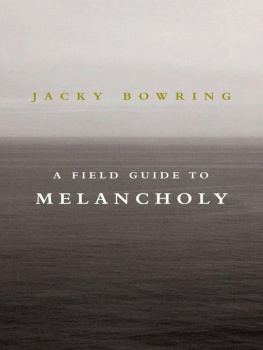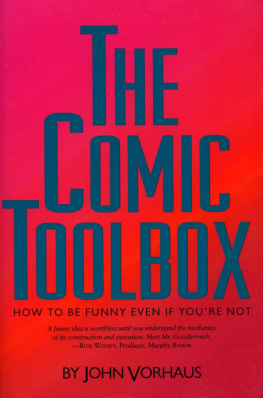
SHAKESPEAREAN MELANCHOLY
EDINBURGH CRITICAL STUDIES IN SHAKESPEARE AND PHILOSOPHY
Series Editor: Kevin Curran
Edinburgh Critical Studies in Shakespeare and Philosophy takes seriously the speculative and world-making properties of Shakespeares art. Maintaining a broad view of philosophy that accommodates first-order questions of metaphysics, ethics, politics and aesthetics, the series also expands our understanding of philosophy to include the unique kinds of theoretical work carried out by performance and poetry itself. These scholarly monographs will reinvigorate Shakespeare studies by opening new interdisciplinary conversations among scholars, artists and students.
Editorial Board Members
Ewan Fernie, Shakespeare Institute, University of Birmingham
James Kearney, University of California, Santa Barbara
Julia Reinhard Lupton, University of California, Irvine
Madhavi Menon, Ashoka University
Simon Palfrey, Oxford University
Tiffany Stern, Shakespeare Institute, University of Birmingham
Henry Turner, Rutgers University
Michael Witmore, The Folger Shakespeare Library
Paul Yachnin, McGill University
Published Titles
Rethinking Shakespeares Political Philosophy: From Lear to Leviathan
Alex Schulman
Shakespeare in Hindsight: Counterfactual Thinking and Shakespearean Tragedy
Amir Khan
Second Death: Theatricalities of the Soul in Shakespeares Drama
Donovan Sherman
Shakespeares Fugitive Politics
Thomas P. Anderson
Is Shylock Jewish?: Citing Scripture and the Moral Agency of Shakespeares Jews
Sara Coodin
Chaste Value: Economic Crisis, Female Chastity and the Production of Social Difference on Shakespeares Stage
Katherine Gillen
Shakespearean Melancholy: Philosophy, Form and the Transformation of Comedy
J. F. Bernard
Forthcoming Titles
Making Publics in Shakespeares Playhouse
Paul Yachnin
Derrida Reads Shakespeare
Chiara Alfano
The Play and the Thing: A Phenomenology of Shakespearean Theatre
Matthew Wagner
Shakespeare and the Fall of the Roman Republic: Selfhood, Stoicism and Civil War in Julius Caesar and Antony and Cleopatra
Patrick Gray
Conceiving Desire: Metaphor, Cognition and Eros in Lyly and Shakespeare
Gillian Knoll
Shakespeares Moral Compass: Ethical decision-making in his plays
Neema Parvini
Shakespeare and the Truth-Teller: Confronting the Cynic Ideal
David Hershinow
Revenge Tragedy and Classical Philosophy on the Early Modern Stage
Christopher Crosbie
For further information please visit our website at edinburghuniversitypress.com/series/ecsst
SHAKESPEAREAN MELANCHOLY
Philosophy, Form and the
Transformation of Comedy

J. F. BERNARD
EDINBURGH
University Press
Edinburgh University Press is one of the leading university presses in the UK.
We publish academic books and journals in our selected subject areas across the humanities and social sciences, combining cutting-edge scholarship with high editorial and production values to produce academic works of lasting importance. For more information visit our website:
edinburghuniversitypress.com
J. F. Bernard, 2018
Edinburgh University Press Ltd
The Tun Holyrood Road,
12 (2f) Jacksons Entry,
Edinburgh EH8 8PJ
Typeset in 12/15 Adobe Sabon by
IDSUK (DataConnection) Ltd, and
printed and bound in Great Britain.
A CIP record for this book is available from the British Library
ISBN 978 1 4744 1733 4 (hardback)
ISBN 978 1 4744 1734 1 (webready PDF)
ISBN 978 1 4744 1735 8 (epub)
The right of J. F. Bernard to be identified as the author of this work has been
asserted in accordance with the Copyright, Designs and Patents Act 1988, and the
Copyright and Related Rights Regulations 2003 (SI No. 2498).
CONTENTS
ACKNOWLEDGEMENTS
I have been thinking about melancholy, comedy and Shakespeare for eleven years, ever since I took a graduate seminar with my masters advisor, Kevin Pask, at Concordia University. My first debt of gratitude is thus his for having put me on this path. From Concordia, I also thank Louis-Patrick Leroux and Meredith Evans.
I have incurred many more debts along the way and will do my best to acknowledge them here.
I owe quite a lot to my doctoral advisor at the University of Montreal, Joyce Boro, for her guidance, wisdom and support. I also thank Heike Harting, Lianne Moyes and Heather Meek.
I am also incredibly grateful to two friends with whom I had the pleasure (and pains) of going through the doctoral program while at U de M. The encouragement and timely insight given by Maude Lapierre and Frederik Byrn Khlert live in the margins of this book.
As a graduate student, I was fortunate enough to hold two research assistantships with the Shakespeare Performance and Research Team at McGill University, as well as to present some of my work at their various meetings, which proved an invaluable learning and growing experience, both personally and professionally. I thank Wes Folkerth, Leanore Lieblein, Denis Salter and Paul Yachnin to that effect.
. I am very grateful to Niamh and to everyone who participated in the event.
In May of 2016, I had the opportunity to partake in a month-long seminar at the University of Michigan thanks to the Early Modern Conversions Project. Though the work I did there pertains to another project, the informal and thought-provoking discussions with colleagues over food and drinks (so much food) were most welcome and have helped shape parts of the argument of this book. My heartfelt thanks go to Alison Searle, Stephen Spiess and Lieke Stelling.
Michael Bristols mentorship and friendship over the years has brought me more than can be expressed here. As evidenced through my critical framework, his work has had a strong influence on mine. His nod, if I can indulge in a baseball metaphor, is equivalent to Sandy Koufax telling me I can pitch. Thanks, Mike.
I am very grateful to everyone at Edinburgh University Press, Commissioning Editor Michelle Houston and Assistant Commissioning Editors Ersev Ersoy and Adela Rauchova, as well as my two anonymous readers, whose comments helped enhance the overall quality of the manuscript. In particular, I wish to thank the series editor, Kevin Curran, for his insight and support throughout this project. The book could not have come to fruition without him. I wish to thank Emily Bernard and Diana Verrall, as well as Diana Neate, for attentive readings of portions of the manuscript. Josie Panzuto also undertook a generous and insightful reading of the introduction at a timely juncture. I thank the amazing (and dare I say magical) Nisha Coleman for her unbelievable insight and diligent reading of the manuscript near the end.
I thank my family and friends for their love and support over the years. Je vous aime tous trs fort.
A portion of , on The Merchant of Venice, appeared previously in Renaissance Studies (The Merchant of Venice and Shakespeares Sense of Humour(s), 28 November 2014, p. 5). I thank them for the permission to reproduce the material here.
SERIES EDITORS PREFACE
Picture Macbeth alone on stage, staring intently into empty space. Is this a dagger which I see before me? he asks, grasping decisively at the air. On one hand, this is a quintessentially theatrical question. At once an object and a vector, the dagger describes the possibility of knowledge (Is this a dagger) in specifically visual and spatial terms (which I see before me). At the same time, Macbeth is posing a quintessentially philosophical question, one that assumes knowledge to be both conditional and experiential, and that probes the relationship between certainty and perception as well as intention and action. It is from this shared ground of art and inquiry, of theatre and theory, that this series advances its basic premise: Shakespeare is philosophical.
Next page
